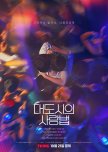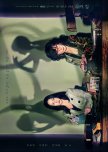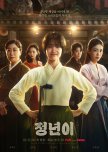
An okay drama that could've been better
This "queer" story falls short of the heights of excellence. Among its flaws, none are as detestable as the violation of a gay male space (a gay club) by a "straight" identifying woman (31:59 of episode 1). The sanctity of a gay male space is not to be disturbed, it's a space for men of like mind and heart to be unabashed in their same-sex desires, away from the harsh gaze of the heteronormative society. Entering a single-sex space with the intention of pursuing someone of the opposite sex to carry back to one’s bed reveals a lack of understanding of, and respect for, the space's true purposeWhat was that sudden, unceremonious reference to HIV? HIV isn't a gay disease and a character's sexuality doesn't warrant the inclusion of HIV in a storyline
The doctor's assumption that the main character's HIV was sexually transmitted is inconsistent with his assertion that the chances of transmitting HIV through sex are low (39:50 of episode 5). The main character's life was unaffected by the disease, and there was no reason why he should be among the rare cases of sexual transmission. HIV is being used for dramatic effect
The narrative device of "straight" identifying female characters befriending gay male characters and becoming the medium through which gay stories are told is tiresome and troubling. Why a "straight" identifying woman, and not a gay woman, a fellow member of the community who shares the same struggles and experiences of discrimination? Can't a gay woman and a gay man get along and be depicted as friends for once?
The conclusion isn't a happily ever after; it's more of an anticlimactic question mark, tinged with the bitterness of an uncertain future. Sad or open endings are a trademark of most "queer" stories, their writers seem to have a vendetta against gay happiness
I find greater comfort and warmth in BLs/gay stories that celebrate the joy of the romantic fulfillment and validation denied to gay couples. They surpass their sad or open-ended "queer" counterparts
Although "Love in the Big City" isn't a masterpiece, its depiction of a gay person's life prevents me from rating it too low. I've decided on a score of 8 that acknowledges the value and the flaws of the story
Was this review helpful to you?

A bittersweet saga of lies, secrets, and acceptance
A family is plunged into a thrilling game of cat and mouse as a mysterious blackmailer threatens to expose their secrets. They race against the clock to uncover the truth, confronting the lies and secrets that have festered in their family along the way. Frustrated, they rally together against a common enemy to protect their ownThe drama takes an unexpected turn when one of the family members (Jae Chan/Do Hyun) comes out. Initially met with doubt and confusion, the family soon realizes that being gay isn't a phase, and that acceptance is more powerful than societal norms. They vow to protect the son/grandson and his truth, no matter the cost. The family emerges from the bitter darkness of their lies, secrets, and betrayals, stronger and more united than before. This act of bravery and acceptance elevates the drama from a typical thriller to a thought-provoking examination of family dynamics
The ending was bittersweet. Jae Chan/Do Hyun was happy with the boy he loved (sweet), the family members "practiced being strangers" (bitter). Family should be a source of unity and strength, not estrangement, and I wished to see them reconcile, walking hand in hand once more
My rating was going to be a 7.5/10, but the sensitive handling of coming out and support for the gay community deserve an additional 0.5 points. They bumped the final rating to an 8/10
Was this review helpful to you?

The Uncanny Counter Season 2: Counter Punch
40 people found this review helpful
The Uncanny Counter returned with a charming and stunning 2nd season
Season 2 is an underrated gem. It's a new story with new conflicts and dynamics to watch on its own. The counters navigate a falling out with their firefighter friend. So Moon moves forward and grows stronger for his uncanny family. Jeok Bong's funny clumsiness carries the counters through the darkest times. And So Moon and Ha Na shine bright with their younger brother/older sister dynamicI would have loved to see Gelly, Wong Yeok and Pil Kwang join the counters or the Yung territory flow through So Moon's body. Season 2 could have adapted the part of the webtoon where So Moon, the Yung territory that he is, casts out spirits without having to summon them. But I'm satisfied with the Yung tears So Moon sheds for Ju Seok. They are a sign of his pure heart and strength
The humor, action and level-headed storytelling mesh well together and have plenty of room to breathe. I'm not overwhelmed or frustrated
Retaining the jovial charm of season 1, the 2nd season is a seamless, breezy watch
The uncanny family, thank you for your hard work. I will miss you ☺️
Was this review helpful to you?

The Escape of the Seven: Resurrection
31 people found this review helpful
Fake news, questionable morality, and troublesome technology
"7 Escape" was an organized mess. It had all the "charm" of a sinking ship. There were plenty of moments that threatened to send me scrambling for the nearest escape route (the poor character development, repetitive conflict, pseudo-romantic encounters, rushed redemption arc), and plenty of others that managed to serve up food for thought on the human conditionOne moment of revelation was the ill-fated character "K," who was swapped at birth and brought up in a wealthy household. After discovering his origins, he was discarded by his once-doting family. K's words, "noone can be family unless you're related by blood" (episode 12, 32:34) and "since I was young, I was the one to entertain and serve Father, why am I the fake son?" (episode 12, 39:25), invite us to question society's obsession with "biological lineage." Far too often, adoptive families or children are seen as "less worthy." The pursuit of a biological "mini-me" takes precedence, as if blood were the determinant of familial bonds. This skewed perception belittles the love, commitment, and joy found in adoptive families
Another moment was the dichotomy between "the real and the fake" (episode 12, 39:00). The drama reminds us that no matter how convincingly something mimics reality, there will always be a distinction. Even if it looks like a duck, swims like a duck, and quacks like a duck, it might not be a duck
Finally, the dangers of technology wielded by those ignorant of its potential. "7 Escape" considers our unhealthy relationship with technology and the ramifications of unchecked technological advancements. It draws attention to humanity's "vulnerability" to the influence of fake news (episode 12, 15:16), a significant issue in the modern, tech-driven society
In conclusion, "7 Escape" was a blend of misguided, cringe-worthy storytelling and surprising insight. It had both irredeemable and redeeming qualities
Was this review helpful to you?

Gay subtext meets historical drama
"She already knows how to make women fall for her without consciously thinking about it ..." (episode 6, 17:43)"I never knew those two [girls] could have such chemistry, they're bringing out the best in each other" (episode 6, 51:47)
"Jeong Nyeon" is more than a glimpse into a woman-centric world of acting. The setting of a woman-only theater that positions women as both the objects and subjects of romantic desire naturally lends itself to a subtextual exploration of same-sex attraction. It's a glimpse into the potential for better gay representation in Korean media
Though the production team’s decision to remove Jeong Nyeon’s female love interest (Kwon Bu Yong) and the explicit same-sex romance is a regrettable concession to society's homophobic expectations (they should've done better), the drama remains commendable for its efforts to integrate elements of gayness throughout the narrative. I was impressed by everyone's performances
"The stars that graced the gukgeuk stage went on to continue their paths as artists, pansori singers, outdoor theatre performers, or even film actors. They have merely dispersed, not disappeared"
That the curtain has fallen on Maeran's story need not spell the end for female gukgeuk. The genre deserves to rise from the ashes, and girls/women should have the chance to soar on its stage again
Was this review helpful to you?



















